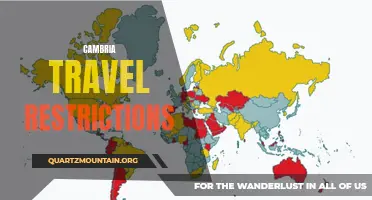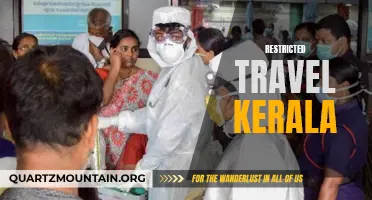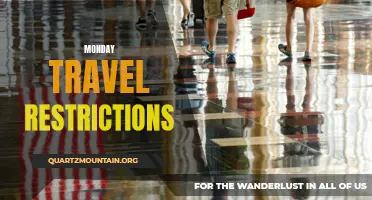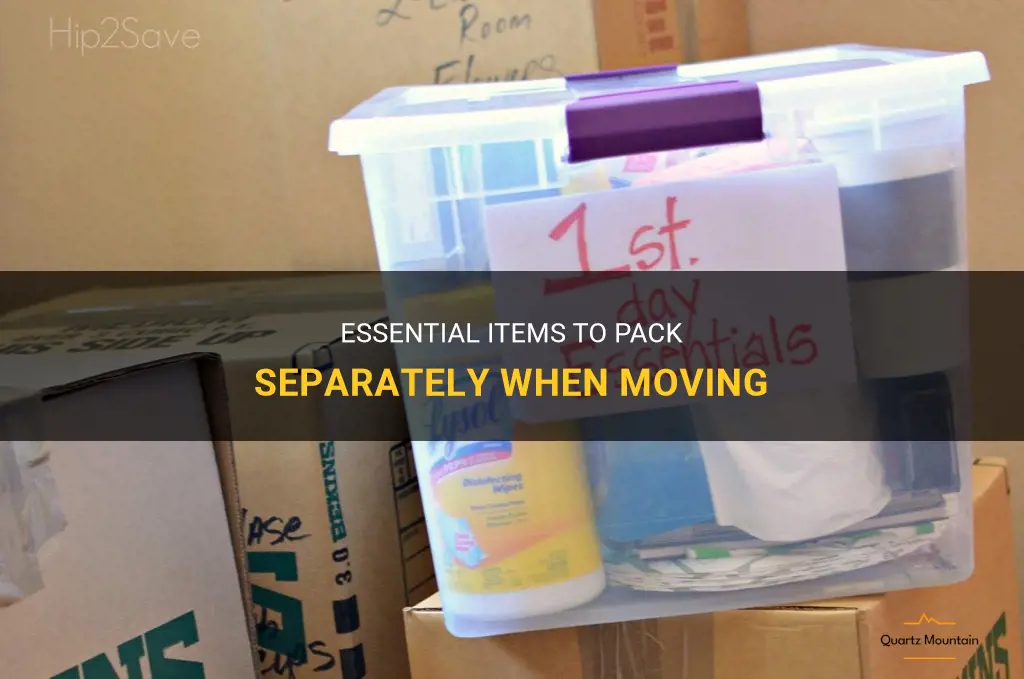
Moving can be a stressful and overwhelming experience. From packing up your belongings to organizing logistics, there are numerous tasks to accomplish. One crucial aspect of moving is ensuring that your essential items are packed separately and easily accessible throughout the process. It's important to have these items readily available to meet your immediate needs and to make the transition as smooth as possible. In this article, we will discuss the essential items that should be packed separately when moving to help you stay organized and prepared for the big day.
What You'll Learn
- What items should I pack separately when moving to ensure they are easily accessible?
- Are there any specific documents or important papers that should be packed separately when moving?
- How should I pack fragile items separately to ensure they are protected during the move?
- Are there any specific items that should be packed separately when moving long distances versus short distances?
- Is there anything I should pack separately that might require special consideration or handling during the move?

What items should I pack separately when moving to ensure they are easily accessible?
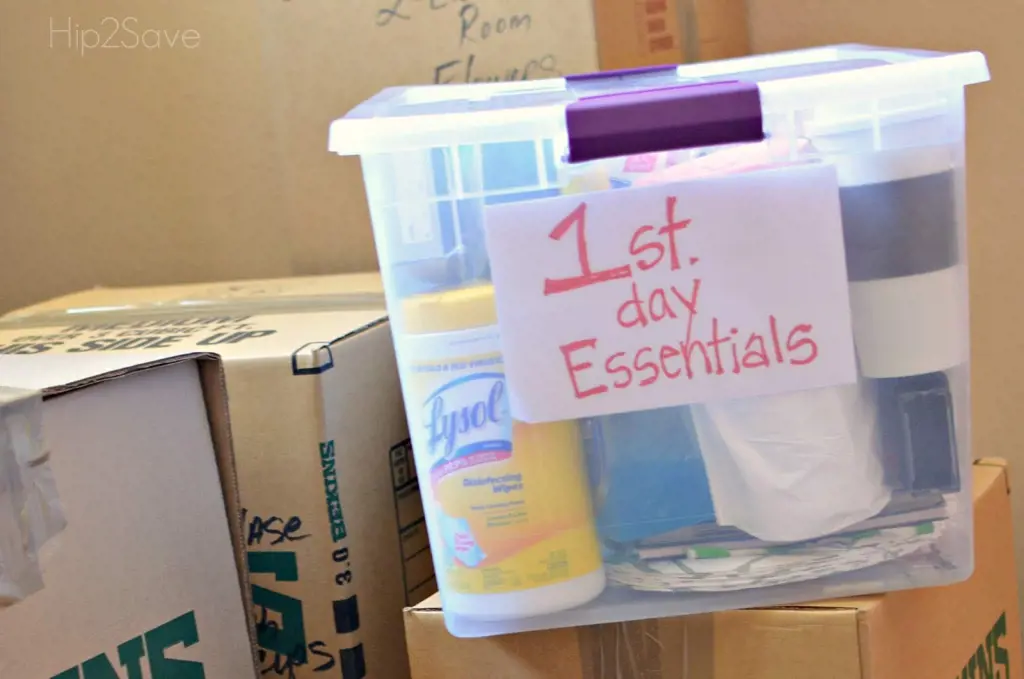
When moving to a new home, it's important to pack your belongings efficiently and effectively. One way to streamline the moving process is to pack certain items separately to ensure they are easily accessible. By doing so, you can avoid the hassle of digging through countless boxes to find essential items. In this article, we will discuss the items you should consider packing separately when moving.
Essential Toiletries:
Toiletries are items that you use on a daily basis, such as toothbrushes, toothpaste, soap, and toilet paper. By packing these separately in a toiletry bag or a clear plastic container, you can easily access them upon arrival at your new home. This will save you the trouble of rummaging through various boxes to find your toiletries, especially when you're tired from the move.
First Aid Kit:
Accidents can happen during the moving process, so it's crucial to have a first aid kit readily available. Pack items such as adhesive bandages, antiseptic wipes, pain relievers, and any prescription medications you may require. Keep the first aid kit in a clearly marked box that is easily accessible in case of emergencies.
Bedding and Linens:
After a long day of moving, you'll want a comfortable place to sleep. Pack your bed sheets, blankets, and pillows separately in a designated box or bag. Label it clearly so that you can easily locate it when it's time to go to bed. Having your bedding readily available will provide you with a sense of comfort and familiarity on your first night in your new home.
Kitchen Essentials:
When it comes to your kitchen, it's beneficial to pack essential items separately so that you can prepare meals without delay. Pack a box with a few pots and pans, cooking utensils, plates, cups, and basic pantry items like salt, pepper, and cooking oil. This will allow you to prepare a simple meal without having to unpack your entire kitchen right away.
Electronics and Chargers:
In today's digital age, most of us rely heavily on our electronic devices. Packing your electronics separately will ensure that they are protected and easily accessible. Use padded or protective cases to pack items like laptops, tablets, and cameras. Keep your chargers organized in a separate bag or box, so you don't have to search for them when you need to charge your devices.
Important Documents:
It's crucial to keep important documents, such as passports, birth certificates, insurance policies, and financial records, in a secure and easily accessible place. Consider packing these items in a separate folder or box and carrying them with you personally during the move. This will give you peace of mind knowing that your important paperwork is safe and easily accessible at all times.
In conclusion, packing certain items separately can greatly simplify the moving process. By ensuring that essential toiletries, a first aid kit, bedding, kitchen essentials, electronics, and important documents are easily accessible, you'll have a smoother transition into your new home. Remember to label your boxes clearly and keep them in a designated area to avoid any unnecessary stress when searching for specific items. Happy moving!
Packing Essentials for a 3-Night Vacation in Puerto Rico
You may want to see also

Are there any specific documents or important papers that should be packed separately when moving?
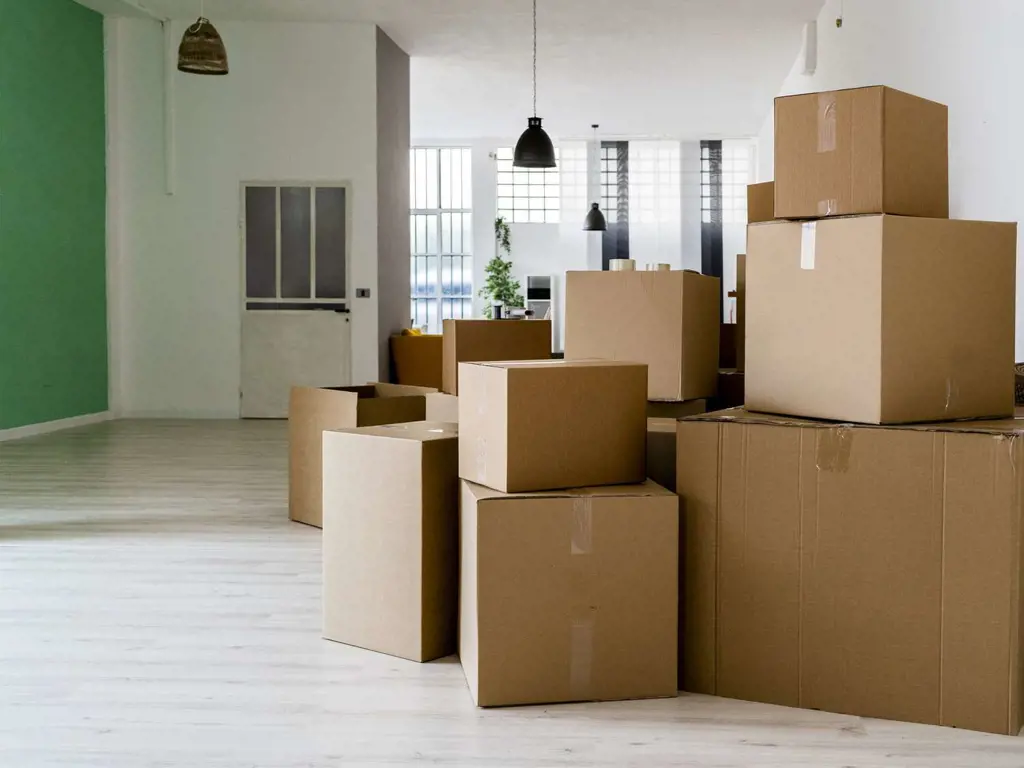
When it comes to moving, it's important to be organized and prepared. One area that often causes stress and confusion is packing important documents and papers. To help alleviate this stress, it's a good idea to set aside a separate box or bag for essential papers and documents that you'll need during and after the move.
Personal identification documents:
This includes passports, driver's licenses, social security cards, and birth certificates. These documents are crucial for many aspects of life, such as getting a new job, opening a bank account, or obtaining government services. Keep these in a secure folder or envelope that you can easily access.
Financial documents:
Important financial documents can be easily misplaced or lost during a move. This includes bank statements, tax records, investment information, and insurance policies. Make sure to pack these separately and consider creating digital copies as a backup.
Medical records:
If you're moving to a new area, it's important to have your medical records with you. This includes information about any allergies, medications, or chronic conditions you may have. Obtain physical or digital copies of your medical records from your doctor or healthcare provider and keep them in a secure folder.
School and work documents:
If you have children, you'll need to transfer their school records to their new school. This includes report cards, transcripts, and any other pertinent documents. For work-related documents, such as employment contracts or important correspondence, make sure to keep these separate as well.
Legal documents:
If you have any legal documents, such as wills, power of attorney documents, or divorce decrees, it's crucial to keep them safe during the move. These documents may be needed for legal or financial matters, so be sure to pack them securely and separately.
Property documents:
If you're selling or renting a property, you'll need to have all the necessary paperwork readily available. This includes lease agreements, mortgage documents, and any other legal documents related to the property. Keep these in a separate folder or binder to ensure they don't get misplaced.
Miscellaneous important papers:
There may be other documents that are specific to your circumstances that you'll want to pack separately. This could include things like car titles, marriage certificates, or adoption papers. Take some time to think about any other essential documents you may have and make sure to pack them separately.
In addition to packing these important documents separately, consider creating digital copies of as many documents as possible. This provides an extra layer of backup and allows you to access them easily if needed.
When packing your important documents, be sure to label the box or bag clearly so you can easily identify it among all your other belongings. Consider keeping this box or bag with you during the move, rather than putting it on the moving truck, to ensure its safety.
By taking the time to pack your important documents and papers separately, you can alleviate stress and ensure that these essential items are readily available when you need them during and after the move.
Essential Items to Pack for a Trip to Lima, Peru in May
You may want to see also

How should I pack fragile items separately to ensure they are protected during the move?
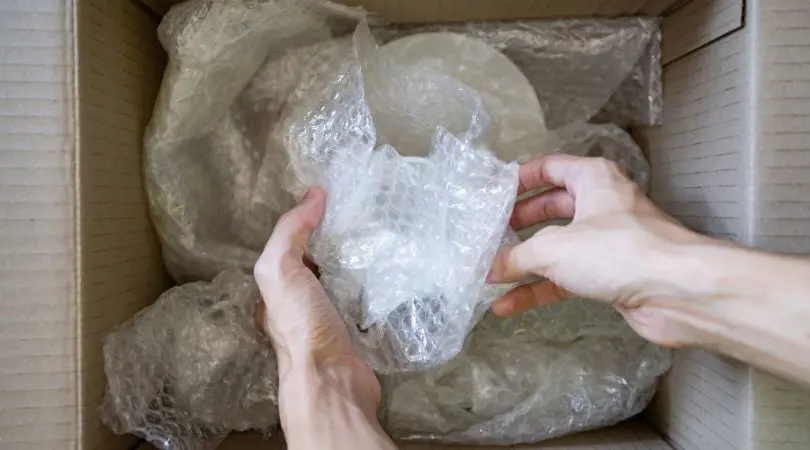
When it comes to moving, one of the biggest concerns is how to pack fragile items to ensure their protection during the move. Fragile items can be easily damaged or broken if not properly packed and protected. Here, we provide you with a step-by-step guide on how to pack fragile items separately to ensure they are well-protected during the move.
- Choose the Right Packing Materials: Start by gathering all the necessary packing materials such as packing paper, bubble wrap, packing peanuts, sturdy boxes, packing tape, and markers. These materials will help provide an extra layer of protection for your fragile items.
- Assess the Fragile Items: Before packing, carefully assess the fragility of each item to determine the level of protection it needs. Delicate items like glassware, ceramics, and electronics require extra care and attention compared to other items.
- Wrap Each Item Individually: Begin by wrapping each fragile item individually using packing paper or bubble wrap. Make sure to cover every side of the item to provide maximum protection. Use tape to secure the wrapping.
- Use Cushioning Material: After wrapping each item, place a generous amount of cushioning material such as packing peanuts or crumpled packing paper at the bottom of the box. This will create a protective layer for the items.
- Arrange Items in the Box Strategically: Pack the items tightly in the box, ensuring there is minimal movement. Place heavier items at the bottom and lighter items on top. Fill any empty spaces with additional cushioning material to prevent shifting during transportation.
- Label the Box: Clearly label the box as "Fragile" to alert movers and yourself to handle it with care. Use arrows to indicate the right side up so that the items are not placed upside down during transportation.
- Reinforce Box: Use additional packing tape to reinforce the box, paying special attention to the edges and corners. This will provide added strength and prevent the box from breaking or being crushed.
- Consider Special Packaging for Particularly Fragile Items: For extremely fragile or valuable items, consider using specialized packaging options such as wooden crates or custom-made foam inserts. These provide an extra layer of protection for high-value items during transportation.
Examples of fragile items that require special packaging include antique furniture, delicate artwork, crystal glassware, and electronic equipment.
By following these steps and taking the time to pack your fragile items properly, you can minimize the risk of damage or breakage during the move. Remember, investing in quality packing materials and taking extra care when packing fragile items will ensure they arrive safely at your new destination.
Essential Items to Prepare Six Months in Advance for an Upcoming Move
You may want to see also

Are there any specific items that should be packed separately when moving long distances versus short distances?
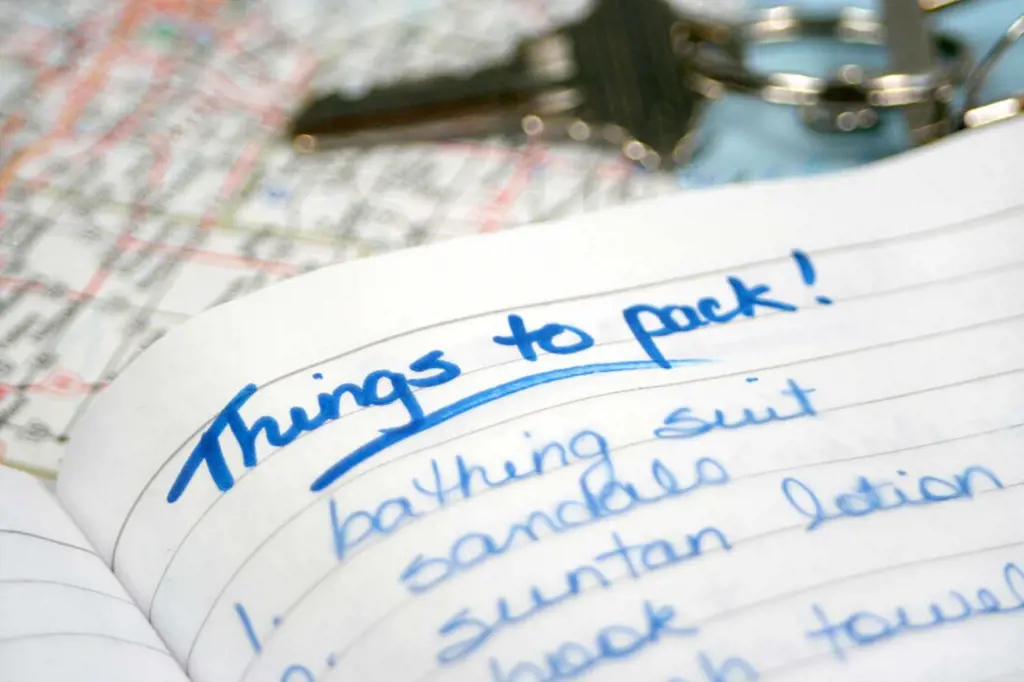
When it comes to moving, whether it's a long distance or a short distance, it's important to pack your items in a way that ensures their safety during transit. However, there are certain items that should be packed separately depending on the distance of the move. This is because long-distance moves often involve more variables and potential risks than short-distance moves. Here are some specific items that should be packed separately when moving long distances versus short distances.
Fragile items: Fragile items such as glassware, porcelain, and artwork should always be packed separately, regardless of the distance of the move. However, when it comes to long-distance moves, there is a higher chance of the items being jostled around or exposed to extreme temperatures. To ensure the safety of these fragile items, it's best to pack them in sturdy boxes with plenty of cushioning, such as bubble wrap or packing peanuts. Additionally, labeling these boxes as "fragile" can help movers handle them with extra care.
Electronics: Electronics, such as televisions, computers, and gaming consoles, are susceptible to damage during transit. When moving long distances, it's especially important to pack these items separately and with care. Consider using the original packaging if available, as it's designed to protect the electronics during shipping. If the original packaging is not available, wrap the items in bubble wrap and secure them in sturdy boxes. It's also advisable to back up any important data before moving electronics to prevent potential loss or damage.
Valuables and important documents: Valuables, such as jewelry, collectibles, and important documents, should always be packed separately, regardless of the distance of the move. In the case of long-distance moves, it’s crucial to keep these items with you rather than trusting them to the moving truck. This way, you can ensure their safety and prevent the risk of loss or theft. Keep these items in a secure bag or box and transport them personally to your new location.
Perishable items: Perishable items, such as food and plants, should never be packed for long-distance moves. Instead, it's best to consume or donate perishable food items and give away plants to friends or neighbors. Transporting perishable items over long distances can lead to spoilage, odors, and potentially attract pests. It's simply not worth the risk.
Chemicals and hazardous materials: Chemicals and hazardous materials, such as cleaning supplies, paint, and propane tanks, should never be packed for any move, whether it's long or short distance. These items can be dangerous to handle and transport, and it's best to dispose of them properly before moving. Contact your local waste management facility for guidance on how to dispose of these items safely.
In summary, when moving long distances, it's important to pack certain items separately to ensure their safety during transit. Fragile items, electronics, valuables, important documents, perishable items, and chemicals and hazardous materials should all be handled with care and packed separately, if necessary. By taking the time to properly pack these items, you can minimize the risk of damage or loss during the move and have peace of mind.
The Essential Food Items to Pack in a Bug Out Bag for Survival
You may want to see also

Is there anything I should pack separately that might require special consideration or handling during the move?

When it comes to moving, there are certain items that require special consideration or handling. Whether it's for safety reasons or to ensure their condition remains intact, packing these items separately is necessary. Here's a list of items that might require special handling during the move:
- Fragile Items: Fragile items such as glassware, china, and porcelain should be packed separately to prevent any breakage. Use bubble wrap, packing paper, or foam packing peanuts to cushion these items and pack them in sturdy, labeled boxes. It's also a good idea to mark these boxes as fragile to alert the movers to handle them with care.
- Electronics: Electronics like laptops, computers, and televisions are delicate and sensitive to temperature changes. It's best to pack them separately and, if possible, in their original packaging. If that's not available, use appropriate packing materials like anti-static bubble wrap and secure them in a box with padding. Remember to remove any ink cartridges, batteries, or other detachable parts before packing.
- Valuables: Valuables such as jewelry, cash, important documents, and heirlooms should always be packed separately and kept with you during the move. It's risky to entrust these items to anyone else, so ensure their safety by carrying them personally.
- Medications: If you have any prescription medications, pack them separately and keep them in a secure and easily accessible place. Consider carrying them with you during the move, especially if you'll be without your belongings for an extended period.
- Plants: Plants are living organisms that require specific care and attention. Moving can be stressful for them, so it's best to pack them separately in well-ventilated boxes or containers. Make sure to water them adequately and protect them from extreme temperature fluctuations during the move.
- Perishable Food: Perishable food items like fruits, vegetables, meat, and dairy products should be consumed or disposed of before the move. Moving companies usually have restrictions on transporting perishable items due to the risk of spoilage and potential damage to other items in transit.
- Hazardous Materials: It is important to note that moving companies cannot transport hazardous materials such as gasoline, propane tanks, chemicals, or explosives. It's best to dispose of these items properly or find an appropriate method of transportation if necessary.
- Pets: If you have pets, they require special consideration during the move. It's essential to pack their food, water bowl, bedding, toys, and any necessary medications separately. Additionally, ensure they have a comfortable and secure place to stay during the move, whether it's a pet carrier or a designated area in the car.
By packing these items separately and giving them the attention they require, you can ensure their safety and protect them from damage during the move. Following these guidelines will help make your move smooth and stress-free.
The Ultimate Guide to Packing for a Trip to Harry Potter World
You may want to see also
Frequently asked questions
Yes, it is highly recommended to pack an essentials bag separately when moving. This bag should contain essential items that you will need immediately upon arriving at your new home, such as toiletries, a change of clothes, important documents, phone charger, and any medications you may need. Having these items easily accessible will help you avoid having to search through boxes and can make the transition to your new home much smoother.
Yes, it is always a good idea to pack valuable items separately when moving. This includes items such as jewelry, important documents, electronics, and sentimental items. Packing them separately will help ensure that they are kept safe and secure during the move. You may also want to consider taking these items with you personally or using a secure shipping method to minimize the risk of loss or damage.
It is a good idea to pack a separate box or bag with cleaning supplies when moving. This will allow you to easily access the necessary supplies to clean your old home before moving out and clean your new home before moving in. Having these supplies readily available will save you time and effort on moving day. Some common cleaning supplies to include are all-purpose cleaner, paper towels, trash bags, and broom/dustpan.


